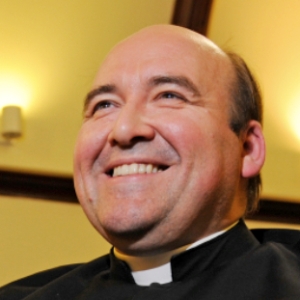Podcast: Play in new window | Download (Duration: 28:50 — 19.9MB) | Embed
Subscribe: Apple Podcasts | Spotify | Amazon Music | Android | Pandora | iHeartRadio | JioSaavn | Podchaser | Gaana | Podcast Index | Email | TuneIn | Deezer | Anghami | RSS | More
Episode 6 – Obstacles to Contemplative Spirituality – St. Teresa, Spiritual Warfare, and the Progress of the Soul with Dan Burke
 Dan Burke and Kris McGregor explore spiritual growth through St. Teresa of Ávila’s fourth mansion in The Interior Castle. They discuss how God uses perceived absences to deepen our relationship with Him, removing consolations to cultivate selfless love. This “aridity” — where one might feel God’s presence less tangibly — is actually a time of spiritual purification. Burke emphasizes that while these moments can be challenging, they are essential to detaching from “mercenary love” (love driven by self-interest) and moving toward love that reflects God’s worthiness.
Dan Burke and Kris McGregor explore spiritual growth through St. Teresa of Ávila’s fourth mansion in The Interior Castle. They discuss how God uses perceived absences to deepen our relationship with Him, removing consolations to cultivate selfless love. This “aridity” — where one might feel God’s presence less tangibly — is actually a time of spiritual purification. Burke emphasizes that while these moments can be challenging, they are essential to detaching from “mercenary love” (love driven by self-interest) and moving toward love that reflects God’s worthiness.
The enemy often tries to exploit these times of dryness by sowing doubt, attempting to make believers question past spiritual experiences. Saints like John of the Cross and Catherine of Siena encourage recognizing such trials as opportunities to grow in humility, reaffirming our dependence on God. He highlights the importance of maintaining spiritual virtues and a disciplined “rule of life” to resist temptations and strengthen virtues, much like keeping physical fitness.
Reflecting on the wisdom of the Desert Fathers, especially regarding battling vices with corresponding virtues, they mention the importance of practices like fasting, which help one gain control over appetites and attachments, allowing for a more disciplined spiritual life. St. Teresa’s practical approach, such as avoiding spiritual pride and learning to respond to wandering thoughts in prayer with humility.
Discerning Hearts Discussion Questions
- Understanding Spiritual Dryness: How can I embrace moments of perceived absence from God as opportunities to grow in faith and selfless love?
- Recognizing the Enemy’s Tactics: In what ways might the enemy try to create doubt in my spiritual journey, and how can I guard against these thoughts?
- The Importance of Virtues: Which virtues in my life need consistent reinforcement, and how can I establish daily practices to cultivate them?
- The Role of Humility in Prayer: How can I respond humbly when my mind wanders in prayer, acknowledging my dependence on God?
- Developing a Rule of Life: What specific spiritual disciplines or rules can I incorporate into my daily routine to strengthen my relationship with God?
- Detachment from Consolations: How can I shift my focus from seeking consolations in prayer to seeking a deeper, more selfless love for God?
- Striving for Union with God: In what ways is God calling me to deeper purification, and how can I open myself more fully to His transforming love?
- Healing Through Awareness: How can I allow my wounds to become channels for God’s healing grace, rather than opportunities for the enemy to lead me astray?
- Learning from the Saints: Which insights from St. Teresa of Ávila and other saints can I apply to my own spiritual struggles and growth?
- Trusting in God’s Patience and Mercy: How can I more fully appreciate and rely on God’s ongoing patience, forgiveness, and love in my daily life?
You can find the book here.
An excerpt from the book:
“Have you ever considered that the devil is active in your prayer life? In the parish church where you attend Mass? In the lives and actions of people of goodwill all around you? The saints remind us of a key aspect of living the spiritual life that we are wont to forget simply because we can’t see it and because we have been conditioned by the media and popular culture to think the devil works visibly only in “bad” people or in extraordinary ways, as in the movies. And although demons are certainly capable of extravagant or extraordinary manifestations, their ordinary work flies under our radar because it just isn’t that spectacular, though it is deadly.
In fact, subtlety, illusion, and deceit are their preferred methods of attack. An invisible battle for souls is being waged in and around us without reprieve, and we remain ignorant of it to our peril. St. Teresa of Avila, great mystic and Doctor of the Church, is best known for her writings on the way God leads souls along the path to union with Him through prayer. What many do not know about St. Teresa is that she also observed the actions of demons working with militant force to lead even good souls astray in ways that might surprise you. She shares these experiences freely in her autobiography, which she was commanded to write under obedience to her spiritual director.“
Burke, Dan; Burke, Dan. The Devil in the Castle: St. Teresa of Avila, Spiritual Warfare, and the Progress of the Soul (p. 12). Sophia Institute Press. Kindle Edition.
For more episodes in this series visit Dan Burke’s Discerning Hearts page here:
Dan Burke is the founder and President of the Avila Institute for Spiritual Formation, which offers graduate and personal enrichment studies in spiritual theology to priests, deacons, religious, and laity in 72 countries and prepares men for seminary in 14 dioceses.
Dan is the author and editor of more than 15 books on authentic Catholic spirituality and hosts the Divine Intimacy Radio show with his wife, Stephanie, which is broadcast weekly on EWTN Radio. Past episodes can be found, along with thousands of articles on the interior life, at SpiritualDirection.com.
In his deep commitment to the advancement of faithful Catholic spirituality, he is also the founder of Apostoli Viae, a world-wide, private association of the faithful dedicated to living and advancing the authentic spiritual patrimony of the Church.
Most importantly, Dan is a blessed husband, father of four, grandfather of one—and grateful to be Catholic.







 Sunday of the Twenty-Seventh Week in Ordinary Time – A Time of Lectio Divina for the Discerning Heart Podcast
Sunday of the Twenty-Seventh Week in Ordinary Time – A Time of Lectio Divina for the Discerning Heart Podcast Thursday of the Twenty-Sixth Week in Ordinary Time – A Time of Lectio Divina for the Discerning Heart Podcast
Thursday of the Twenty-Sixth Week in Ordinary Time – A Time of Lectio Divina for the Discerning Heart Podcast

 Wednesday of the Twenty-Sixth Week in Ordinary Time – A Time of Lectio Divina for the Discerning Heart Podcast
Wednesday of the Twenty-Sixth Week in Ordinary Time – A Time of Lectio Divina for the Discerning Heart Podcast



 From the book description:
From the book description: